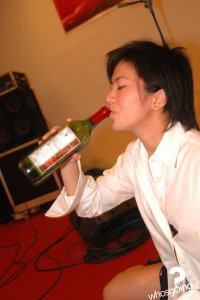
A Bordeaux-style barrel from Seguin Moreau Napa Cooperage
Small crop, high prices, barrel alternatives and uncertain economy may mean discounts
Napa, Calif. -- It could be a good year to buy barrels. With a short crop expected, some cooperages may have extra inventory on hand that they don't want to store for a year.
The stated reason is the expected smaller than average harvest--the second in a row-- but the unfavorable exchange rate and rising acceptance of barrel alternatives seem to be factors, too.
The 2007 harvest in California was 3.2 million tons, and the U.S. Department of Agriculture forecasts 3.4 million tons this year, up 3% from a year ago, but most industry observers are skeptical, predicting 3.2 million tons or less, some even below 3 million tons.
"Customers don't know if this will be a small crop, and they obviously don't want to order barrels that they don't need," says François Peltereau-Villeneuve, president of Seguin Moreau Napa Cooperage. "This year, lots of coopers brought in more barrels than they may need."
Michael Peters of Barrel Builders in St. Helena, Calif., agrees. "The frost and other problems are creating a lower crop. Last year was also small, and some wineries still have barrels left from then, too. Many are waiting to see how many they really need."
Chris Dearden, winemaker and general manager at Benessere Winery in St. Helena, says he's personally run into a surplus of barrels. "Some coopers have stock in inventory now, when in the past they were sold out at this time," he says.
François Peltereau-Villenueve, president, Seguin Moreau Napa CooperageDearden, who formerly worked for Seguin Moreau, notes that the big cooperages must plan well in advance, starting to produce barrels for inventory and shipping them to the U.S. from June to September. "They couldn't make and ship all the barrels they need at once. Many offer early-delivery discounts to encourage ordering early," he says.
Dearden also imports wine barrels for Gamba USA. His barrel company only deals with custom orders, so shouldn't suffer, but he notes, "It really hit us in 2005, which was a huge year. We could have sold many more barrels." The wine grape crush in 2005 was 3.74 million tons, an increase of 35% over 2004.
Doug Fletcher, vice president/director of winemaking for the Terlato group, oversees activities at Chimney Rock, Rutherford Hill, Alderbrook, Sanford and Terlato wines. He says, "Most wineries bought their barrels this spring before anyone knew what the harvest size would be. So in general, I think you will just see an increase in the percentage of new oak in the '08 wines."
Peters, like many others, feels that the cost of barrels is a big issue, however, and Scott Harrop of United Barrels in Napa says, "The exchange rate is a big factor in how many barrels we sell."
According to Peltereau-Villeneuve, barrel pricing in Euros went up about 15% in the last 12 months because of the exchange rate. Chris Phelps, the winemaker at Swanson Vineyards & Winery, Rutherford, Calif., says his average barrel price rose from $924 last year to $1093, an 18% increase.
Harrop at United Barrels is now importing less expensive Ukrainian barrels for the first time this year to help compensate.
Chris Phelps, winemaker, Swanson Vineyards & WineryFletcher agrees that the problem is the cost of barrels. "The real problem is the exchange rate. The massive increase in barrel costs parallels the exchange rate."
Another big factor is alternatives to barrel. "The biggest wineries are going to adjuncts in a huge way," says Barrel Builder's Peters.
Harrop also reports big growth in barrel alternatives. "They won't be in $100 bottles of wine, but they're even being used in expensive wines. There's less feeling of embarrassment about it, too," he notes. "The southern hemisphere wineries use them, and they're even legal now in France."
Harrop admits his selling season is usually over by now, but he's still expecting 20 to 30% of his orders to come in. "The winemakers are waiting for the go-ahead from the accountants in this uncertain economy," he explains.
Fletcher says," I don't know how flexible the discount will be for coopers who have excess barrels. If coopers produced more barrels on speculation they are surely stuck with them."
Still, some coopers may not be willing to sit on the expensive barrels. "For those who don't want to finance that inventory for a year, they may decide to sell at a discount," Peltereau-Villeneuve says. "It's likely that some wineries will make good deals on barrels during the harvest."
Paul Franson



